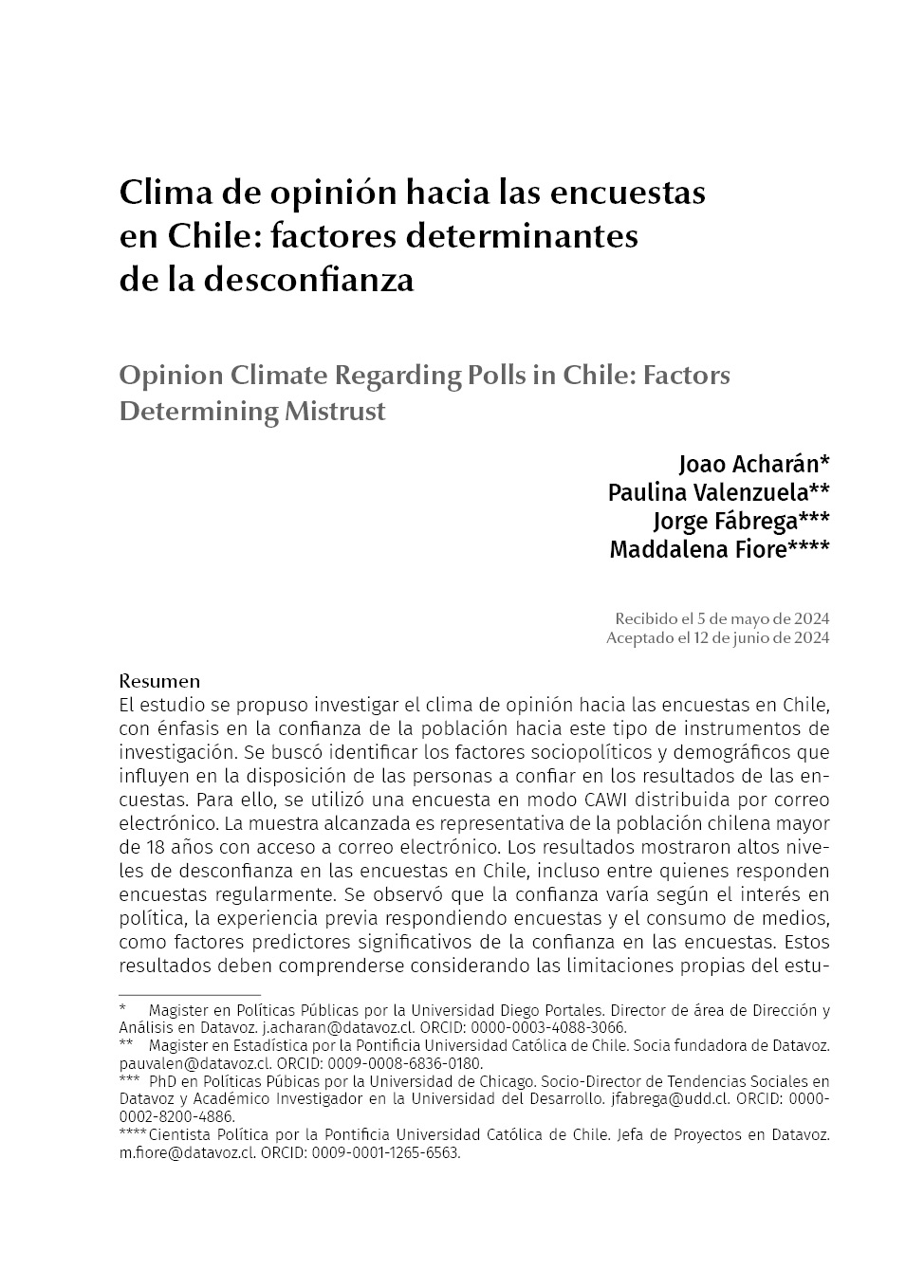Clima de opinión hacia las encuestas en Chile: factores determinantes de la desconfianza
Contenido principal del artículo
Resumen
El estudio se propuso investigar el clima de opinión hacia las encuestas en Chile, con énfasis en la confianza de la población hacia este tipo de instrumentos de investigación. Se buscó identificar los factores sociopolíticos y demográficos que influyen en la disposición de las personas a confiar en los resultados de las encuestas. Para ello, se utilizó una encuesta en modo CAWI distribuida por correo electrónico. La muestra alcanzada es representativa de la población chilena mayor de 18 años con acceso a correo electrónico. Los resultados mostraron altos niveles de desconfianza en las encuestas en Chile, incluso entre quienes responden encuestas regularmente. Se observó que la confianza varía según el interés en política, la experiencia previa respondiendo encuestas y el consumo de medios, como factores predictores significativos de la confianza en las encuestas. Estos resultados deben comprenderse considerando las limitaciones propias del estudio, considerando el posible sesgo asociado a evaluar la confianza en encuestas mediante la aplicación del mismo tipo de instrumento. El estudio contribuye al entendimiento del clima de opinión hacia las encuestas, resaltando la importancia de factores sociopolíticos en la confianza hacia estos instrumentos, más allá de características demográficas.
Detalles del artículo
Citas en Dimensions Service
Citas
Asher, H. (2007). Polling and the Public: What Every Citizen Should Know. CQ Press.
Castorena, O., Lupu, N., Schade, M. y Zechmeister, E. J. (2023). Online Surveys in Latin America. PS: Political Science and Politics, 56(2), 273–280. https://doi.org/10.1017/S1049096522001287
Bellia Calderón, L. y Echeverria, M. (2022). Influencia auto reportada de las encuestas en la intención de voto y factores explicativos. Cuadernos.info, (53), 117-137. https://doi.org/10.7764/cdi.53.48517
Cea D’Ancona, M. A. (2022). Calidad, confianza y participación en encuestas. Papers, 107(4), e3074. https://doi.org/10.5565/rev/papers.3074
Couper, M. P. (2017). New developments in survey data collection. Annual Review of Sociology, 43, 121-145. https://doi.org/ 10.1146/annurev-soc-060116-053613
de Leeuw, E. D., Hox, J. J. y Luiten, A. (2018). International nonresponse trends across countries and years: an analysis of 36 years of Labour Force Survey data. Survey Insights: Methods from the Field. Retrieved July 2019 from https:// surveyinsights.org/?p=10452. https://doi.org/10.13094/SMIF-2018-00008.
de Leeuw, E., Hox, J., Silber, H., Struminskaya, B. y Vis, C. (2019). Development of an international survey attitude scale: Measurement equivalence, reliability, and predictive validity. Measurement Instruments for the Social Sciences, 1(9). https://doi.org/10.1186/s42409-019-0012-x
Díaz de Rada, V. y Núñez Villuendas, A. (2008). Estudio de las incidencias en la investigación mediante encuesta. El caso de los barómetros del CIS. Centro de Investigaciones Sociológicas. Colección Monografías, n.º 251.
Gálvez Muñoz, L. A. (2011). Las encuestas electorales y el debate sobre su influencia en las elecciones (Electoral polls and the debate about their influence on elections). Revista Mexicana de Opinión Pública, 11, 25-43. https://doi.org/10.22201/fcpys.24484911e.2011.11.41334
Gengler, J. J., Tessler, M., Lucas, R. y Forney, J. (2021). ‘Why Do You Ask?’ The Nature and Impacts of Attitudes towards Public Opinion Surveys in the Arab World. British Journal of Political Science, 51(1), 115–136. https://doi.org/10.1017/S0007123419000206
Goyder, J. (1986). Survey on surveys. Limitations and potentialities. Public Opinion Quarterly, 50, 27-41. https://doi.org/10.1086/268957
Groves, R. M. y Couper, M. P. (1998). Nonresponse in household interview surveys. John Wiley & Sons.
Hox, J., de Leeuw, E. y Vorst, H. (1995). Survey participation as reasoned action: A behavioral paradigm for survey nonresponse?. Bulletin of Sociological Methodology, 48, 52-67. https://doi.org/10.1177/075910639504800109
Krosnick, J. A., Presser, S., Fealing, K. H., Ruggles, S. y Vannette, D. L. (2015). The future of survey research: Challenges and opportunities. National Science Foundation.
Lepkowski, J. M. y Couper, M. P. (2002). Nonresponse in the second wave of longitudinal household surveys. En R. M. Groves et al. (Eds.), Survey nonresponse (121-134). John Wiley and Sons.
Loosveldt, G. y Storms, V. (2008). Measuring public opinions about surveys. International Journal of Public Opinion Research, 20(1), 74-89. https://doi.org/10.1093/ijpor/edn006
Lyberg, L. y Dean, P. (1992, 17 de mayo). Methods for reducing nonresponse rates: A review. [Paper presentado para la conferencia anual de la American Association for Public Opinion Research]. Annual AAPOR Conference, St Petersburg, FL. https://aapor.org/wp-content/uploads/2024/05/AAPORPrograms1992.pdf
Meyer, B. D., Mok, W. K. C. y Sullivan, J. X. (2015). Household surveys in crisis. Journal of Economic Perspectives, 29(4), 199-226. https://doi.org/10.1257/jep.29.4.199
Paletz, D. L., Short, J. Y., Baker, H., Campbell, B. C., Cooper, R. J. y Oeslander, R. M. (1980). Polls in the Media: Content, Credibility, and Consequences. The Public Opinion Quarterly, 44(4), 495-513. https://doi.org/10.1086/268619
Rogelberg, S., Fisher, G., Maynard, D., Hakel, M. y Horvath, M. (2001). Attitudes toward surveys: Development of a measure and its relationship to respondent behavior. Organizational Research Methods, 4(3), 3-25. https://doi.org/10.1177/109442810141001
Roper, B. (1986). Evaluating polls with poll data. Public Opinion Quarterly, 50, 10–17. https://doi.org/10.1086/268955
Schmiedeberg, C. y Schröder, J. (2024). Did You Like the Interview? Interviewer Effects on Respondents’ Interview Pleasantness Ratings. Field Methods, 36(1), 21-36. https://doi.org/10.1177/1525822X231209251
Segovia, C., Haye, A., González, R., Manzi, J. y Carvacho, H. (2008). Confianza en instituciones políticas en Chile: un modelo de los componentes centrales de juicios de confianza. Revista de ciencia política (Santiago), 28(2), 39-60. https://doi.org/10.4067/S0718-090X2008000200002
Silber, H., Moy, P., Johnson, T. P., Neumann, R., Stadtmüller, S. y Repke, L. (2022). Survey participation as a function of democratic engagement, trust in institutions, and perceptions of surveys. Social Science Quarterly, 103, 1619–1632. https://doi.org/10.1111/ssqu.13218
Sjoberg, G. (1955). A questionnaire on questionnaires. Public Opinion Quarterly, 18, 423–427.
Stocké, V. (2006). Attitudes toward surveys, attitude accessibility and the effect on respondents’ susceptibility to nonresponse. Quality and Quantity, 40, 259-288. https://doi.org/10.1007/s11135-005-6105-z
Stocké, V. y Langfeldt, B. (2004). Effects of survey experience on respondents’ attitudes towards surveys. Bulletin of Sociological Methodology, 81, 5-32. https://doi.org/10.1177/075910630408100103

Revista Mexicana de Opinión Pública por Universidad Nacional Autónoma de México se distribuye bajo una Licencia Creative Commons Atribución-NoComercial-SinDerivar 4.0 Internacional.
Basada en una obra en http://revistas.unam.mx/index.php/rmop.
